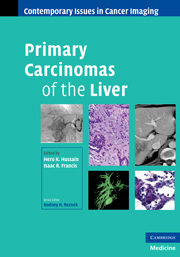Book contents
- Frontmatter
- Contents
- Contributors
- Series foreword
- Preface to Primary Carcinomas of the Liver
- 1 Epidemiology of hepatocellular carcinoma and cholangiocarcinoma
- 2 Surveillance and screening for hepatocellular carcinoma
- 3 Pathology of hepatocellular carcinoma, cholangiocarcinoma, and combined hepatocellular-cholangiocarcinoma
- 4 Radiological diagnosis of hepatocellular carcinoma
- 5 Staging of hepatocellular carcinoma
- 6 Surgical treatment of hepatocellular carcinoma: resection and transplantation
- 7 Non-surgical treatment of hepatocellular carcinoma
- 8 Radiological identification of residual and recurrent hepatocellular carcinoma
- 9 Radiological diagnosis of cholangiocarcinoma
- 10 Staging of cholangiocarcinoma
- 11 Treatment of cholangiocarcinoma
- 12 Uncommon hepatic tumors
- Index
- Color plates
- References
5 - Staging of hepatocellular carcinoma
Published online by Cambridge University Press: 04 August 2010
- Frontmatter
- Contents
- Contributors
- Series foreword
- Preface to Primary Carcinomas of the Liver
- 1 Epidemiology of hepatocellular carcinoma and cholangiocarcinoma
- 2 Surveillance and screening for hepatocellular carcinoma
- 3 Pathology of hepatocellular carcinoma, cholangiocarcinoma, and combined hepatocellular-cholangiocarcinoma
- 4 Radiological diagnosis of hepatocellular carcinoma
- 5 Staging of hepatocellular carcinoma
- 6 Surgical treatment of hepatocellular carcinoma: resection and transplantation
- 7 Non-surgical treatment of hepatocellular carcinoma
- 8 Radiological identification of residual and recurrent hepatocellular carcinoma
- 9 Radiological diagnosis of cholangiocarcinoma
- 10 Staging of cholangiocarcinoma
- 11 Treatment of cholangiocarcinoma
- 12 Uncommon hepatic tumors
- Index
- Color plates
- References
Summary
When determining the prognosis of patients with solid tumors, tumor staging and tumor grading are important factors to take into account. Tumor staging describes the extent of tumor in the primary organ and throughout the body. Staging is important for planning treatment, estimating prognosis, providing a standardized platform to evaluate new treatments, and comparing the results of different studies. In the majority of solid organ tumors, staging is determined at the time of surgery and by pathological examination of the resected specimen using the Tumor–Node–Metastasis (TNM) classification.
In addition to tumor burden, histological tumor-grading systems have been shown to offer prognostic information on some cancers such as prostate, breast, and kidney. Tumor burden and grade cannot be assessed in most patients with hepatocellular carcinoma (HCC), because only about a third of the patients will undergo surgical therapies and some of these patients may have received local therapies prior to surgery limiting the histological examination.
The presence of underlying liver cirrhosis in patients with HCC adds an important dimension that cannot be ignored when discussing prognosis and treatment for these patients, and it is what differentiates HCC from other solid tumors. The majority of patients with HCC have underlying cirrhosis, and the degree of hepatic dysfunction determines which treatment can be applied. Another important factor in the prognosis of patients with HCC is performance status, although it is not HCC-specific. Performance status has been shown to be an important prognostic factor in HCC.
- Type
- Chapter
- Information
- Primary Carcinomas of the Liver , pp. 51 - 56Publisher: Cambridge University PressPrint publication year: 2009
References
- 1
- Cited by



